Sisters’ service tour in the early days of the Chinese Church
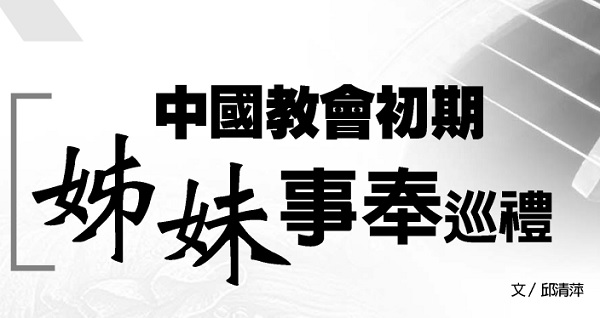
In 1807, missionary Morrison came to China and began Christian missionary work in China. Fourteen years later, the first woman to believe in Christ and be baptized was Liang Fa’s wife. One hundred years later, the number of female believers in China increased to more than 120,000, accounting for 37% of the church’s population.
Western women's missionary movement
When the missionaries first came to China, the Qing government did not allow women’s family members to enter the country. At that time, the Western Mission Society did not send out single female missionaries, and (male) missionaries in China were limited to men and women who did not have close relationships with each other. It was difficult to contact local women for preaching, and women’s ministry progressed very slowly. Later, the Treaty of Nanjing in 1842 opened up trade among the five countries. Missionaries could take their wives and families to preach in various places, and women's opportunities to come into contact with the gospel increased.
At that time in the West, some missionaries ignored the opposition of mission societies and organized women's missionary groups. The women's missionary movement began vigorously in the late 1860s. Missionary leader Helen Montgomery reported on the results of the fifty-year (1860-1910) women's propaganda movement in China in her book "Western Women in the East". She said:
“In 1861 we had only one (female) missionary working in Burma; in 1909 we had 4,710 single sisters in the field. In 1861 there was only one women’s mission in the United States; by 1910 there were 44. Previously supported There are only a few hundred people, but now there are at least 2 million yuan. In the past, the donations received were only 2,000 yuan, but now they are at least 4 million yuan.”1
Women’s life reform in China’s self-improvement movement
The late Qing Dynasty and the early Republic of China were a turbulent era in China. The Qing government was corrupt and incompetent, foreign countries invaded, the Opium War broke out, and unequal treaties were signed. People of insight rose up to demand reforms, including reforming the identity and role of women. Liang Qichao believed that one of the important reasons for the country's weakness was that half of the population, women, were parasites. Not only could they not participate in national construction and production, they were also a large group without intelligence, physical strength, or financial resources. He also observed that the West was strong because their women were very independent and could contribute to society and the country, so he launched a self-improvement movement to reform the law. Later, there was the May Fourth Movement, in which women's rights became a very important issue. To overthrow feudalism, we must abolish the consciousness of enslaving women and promote reform of women's lives.
Missionary work and the Chinese self-improvement movement produced a series of reforms, such as the abolition of the millennium-old foot-binding custom, the establishment of girls' schools, hospitals, orphanages (to house abandoned baby girls), as well as prostitution, legal issues of marriage equality, etc. As their education level improves, women begin to join the ranks of social production. Some young women (especially the daughters of preachers have priority) can study abroad and work as doctors, lawyers, teachers, etc. after completing their studies, which greatly improves the status of women.
In addition, male and female missionaries could work side by side, providing Chinese women with a model to follow. However, Dr. Liang Jialin made an interesting observation: Western missions allow female missionaries to fight side by side with male missionaries in the field, and can participate in any ministry. It is just a "stop-gap measure"; once they return to their home countries, they will not be able to work in the mother church. Even preaching is not allowed, let alone other leadership tasks. Dr. Liang said that this is actually a double discrimination of race and gender2! The missionary association regards the people in the mission field as inferior in terms of quality and status and as "second-class". Therefore, there is no need to have any taboos in sending the church's second-class citizens, female missionaries, to work there. But as soon as the missionary returns to his "high-class" mother church, he has no choice but to feel ashamed of himself!
Sisters’ ministry tour in the early 20th century
1. Bible women
Beginning in the second half of the 19th century, many single sisters devoted themselves to missionary work in China. At first, most of the sisters who converted to the Lord belonged to the poor peasant class. The "ladies" of the upper class were not allowed to have casual contact with the outside world or join foreign religious organizations. What's more, they all had bound feet, which made it difficult for them to move. Since men and women could not gather together at that time, female missionaries had to perform comprehensive work among women, from preaching, teaching to shepherding; from baptizing to visiting, and even itinerant preaching. This way of serving later became a model for many Chinese female missionaries.
In the early days, female missionaries were mostly helpers in the missionaries' families, and later they shared the responsibilities of the church; they were mothers or wives of male missionaries/pastors, or women with a little education joined the missionary line-up. Middle-aged widows are more likely to serve as missionaries. Their family responsibilities have been fulfilled and their children have grown up. Regardless of status and age, it is more convenient for them to go to the countryside to preach with female missionaries. There are fewer single women because it is inconvenient to "show their faces" outside.
As salaried persons, female preachers may have been the first opportunity for women at that time to work and earn money. Generally, the salary of female preachers is less than half of that of male preachers. Many of them are only paid part-time, and their main responsibility is to assist male preachers.
The work of early female missionaries was mainly to assist female missionaries, serve as translators or language teachers, preach the gospel to women, visit homes or hospitals, and teach women to read and read the Bible. Those with professional training can also serve as teachers or principals in girls' schools, nurses or doctors in hospitals, or even deans. At first, most female preachers were hired by the Western Missionary Society. Later, they began to preach freely and were not controlled by the Western Missionary Society. Some even started to open up wasteland and start businesses.
Guo Peilan quoted Luella Miner's report that there were ninety female preachers in China in 1876. Forty years later (1917) the number increased to more than 2,500, an increase of almost thirty times, and by 1920 it rose to 3,300. However, the number of female preachers decreased significantly in the 1930s. As women's educational opportunities improved, society was more willing to use women's gifts and contributions than the church, and they received better treatment. Many sisters joined society3.
Chen Yuling
She first went to Yunnan as a missionary to open up wasteland and founded seven churches, three of which she founded alone. Her ministry was very comprehensive, the power of the Holy Spirit was with her, and signs and wonders followed her testimony. In addition to leading meetings everywhere, she also planted churches, pastored churches, taught theology, wrote Bible commentaries, and prayed for healing. According to Dr. Liang Jialin, Chen Yuling was the first Chinese female pastor in the world, who was ordained in 1938. However, she was later influenced by Watchman Nee and believed that sisters should cover their heads and leave the work and authority of public appearances to their brothers. As a result she gave up the title of pastor.
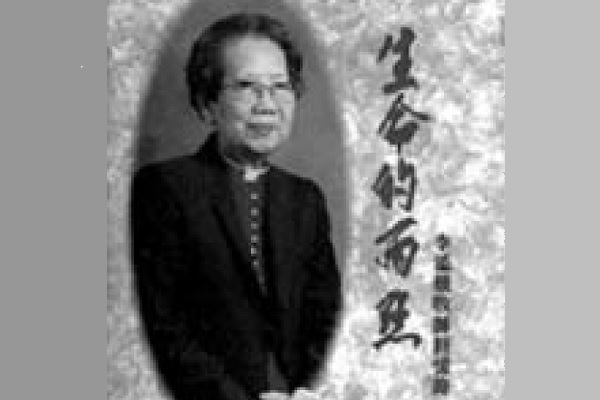
▲Pastor Li Tianyuan’s book "Raindrops of Life".
Li Tianyuan
Another early ordained female priest was the Rev. Li Tianyuan of the Anglican Church. It turns out that transportation was inconvenient during the Anti-Japanese War, and many Anglicans did not observe Holy Communion for a long time because they had no priests. Bishop He Minghua thought that neither a male pastor nor a female pastor could be found, so he appointed Li Huili as pastor to fill the gap. Unexpectedly, after the war, transportation was restored and there were enough male priests to preside over Holy Communion. Many Anglican provinces and dioceses came together to oppose Li Tianyuan's appointment as pastor. Following the pressure from the Anglican Archbishop, Pastor Li gave up his title as pastor, otherwise He Minghua must give up his position as bishop. As a result, Pastor Li had to give in4.
2. Female revival evangelists
At the beginning of the 20th century, China was experiencing the pain of rebirth. People's minds were changing. There were great revivals in various places. God raised up some revival evangelists, many of whom were sisters. In the history of the Chinese church, servants of God who were greatly used by God, such as Wang Mingdao, Watchman Nee, Song Shangjie, Ji Zhiwen, Zhao Shiguang, etc., are familiar to everyone, but few people know that many sisters of their contemporaries were also greatly used by God. .
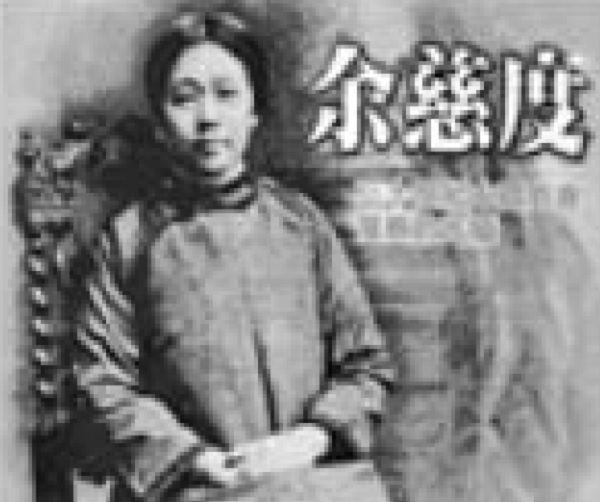
▲"Cadogan Yu - the pioneer of the revival of the Chinese church in the 20th century".
Yu Cidu
Yu Cidu was born in a Christian family. Her father was a military doctor and a pastor. She entered medical school at the age of fifteen and studied for eight years. Later, he went to South Korea for missionary work. After returning to China, he was led by the Holy Spirit to be involved in the great revival and became an important instrument of God. Professor Wu Xiuliang believes that Dora Yu was the most famous revival evangelist in China before the 1930s and had an indelible impact on the revival movement of the Chinese church. However, few people have heard of her name. She is a person buried in male-dominated history.
Professor Wu unearthed her from the tiles of history. After tracing the historical data, she summarized her contributions as follows:
1. She was the first Chinese preacher to break away from the economic control of the Western Missionary Society and live entirely by faith.
2. She is the only Chinese preacher invited to be the main speaker at the Keswick Convention, the world's most spiritually authoritative conference.
3. She has trained many competent female preachers through the "Bible Study and Prayer Center". The preachers trained by her preaching became key figures in the second revival movement after 1930.
4. Watchman Nee is one of them. When he was seventeen years old (1920), he attended an evangelistic meeting led by Dora Yu and was inspired to convert to the Lord and devote himself to preaching. Witness Lee dedicated his life in 1925. Many revival evangelists such as Wang Zai and Zhao Shiguang also devoted themselves to preaching under Yu's influence. 5
5. Pastor Zhuang Zukun said: "In the 1920s, God raised up many sisters like Yu Dora to become leaders of the church, and then used them to bring out many brothers to take over. This is still controversial in the Chinese church today about the role of women in the church. "The role of the church" provides valuable historical cases that are worthy of our consideration." 6
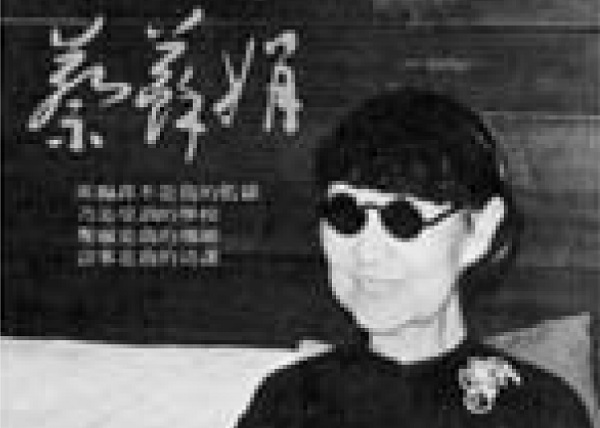
Cai Sujuan
My father was a high-ranking official in the Qing Dynasty. He was originally a devout Buddhist and looked down upon Christianity. But later, in order to learn English, she entered a girls’ school run by missionaries and eventually believed in the Lord. She was later called by God to organize the "China Domestic Missionary Team" with some co-workers. The initial goal was to preach the gospel in Yunnan because there were very few missionaries there. She often led revival evangelistic meetings and also went to the countryside to preach, and many people were converted to the Lord. Later, he contracted an eye disease and spent fifty years in a darkroom using his bed as a platform and the darkroom as a church. He led countless people to the Lord and became the "Queen of the Darkroom."
In the late 1920s, women known everywhere included Wang Shu, Jiao Weizhen, Hu Yunlin, Lan Ruxi, Hu Meilin, Liu Suqin, etc. Peter quoted the prophet Joel's prophecy in Acts 2:“God poured out His Spirit on His servants and on His handmaidens, and they became powerful witnesses of the Word of God.” (Refer to Acts 2:18).
Wang Shu is from Shandong. She once served as a teacher and editor. Later, she preached freely and was greatly used by the Lord, leading many people to repent. Jiao Weizhen was also from Shandong. She once taught at Jinling Theological School for Girls, and later traveled around to preach, preaching the gospel to tens of thousands of people in one year and preaching nearly 300 times. He once opened the Lingguang Spiritual Seminary, and later taught at the China Theological Seminary. In 1940, he also served as the main lecturer of the Hong Kong and Kowloon Spiritual Training Association. After the founding of the People's Republic of China, he co-founded a nursing home for retired preachers with He Shouying and others. Hu Yunlin is a native of Shanghai. She leads revival evangelistic meetings not only in Chinese churches but also in Western churches. During the Anti-Japanese War, orphanages were also opened to accommodate hundreds of needy children. Lan Ruxi and Hu Meilin were both talents trained by Western missionaries. They studied in the United States and later returned to China to teach and preach. Lan Ruxi serves as the dean of Bethel Theological Seminary, and Hu Meilin serves as the dean of Bethel Orphanage7.

▲Hu Yunlin’s book "He Holds My Hand".
Dr. Liang Jialin analyzed that a very important reason for the rise of female revivalists is that if sisters have the opportunity to receive education or theological education, they will have greater room for ministry. According to his observation: Female revival speakers are usually trained by female Western priests, and they always have a good teamwork with Western priests. Male revivalists, on the other hand, have poor team spirit. They usually break up after working together for a period of time and start a new business on their own. Another characteristic is that most of them are single and often form close co-workers, such as Cai Sujuan and Li Man, Hu Zunli and Shi Meiyu, Lan Ruxi and Hu Meilin, etc. 8
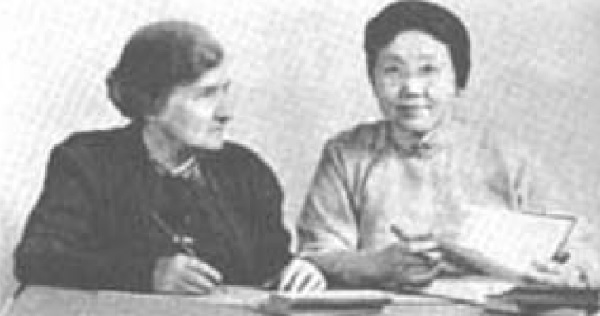
▲Priest Hu Zunli and Dr. Shi Meiyu.
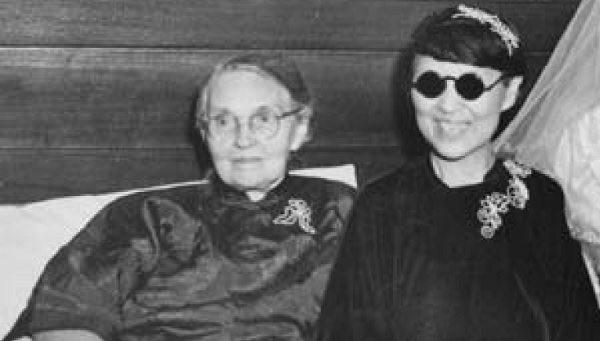
▲Cai Sujuan and Li Man.
3. Theologians and writers
Many sisters who have graduated from Bible colleges cannot be sent to serve in pastoral work. Firstly, the church does not allow women to take charge alone, and secondly, women are still in the minority teaching men. As a result, sisters who graduated from seminaries often served as teachers in girls' schools. If they had medical burdens and interests, they were sent to work in church hospitals after training. Therefore, few sisters have the opportunity to have deeper training in theology. In 1922, there were about thirty-eight girls' Bible schools and women's seminaries in the country, but only two truly qualified as seminaries. Taught by female missionaries and female revival evangelists.
Luo Shengai
Born in a Christian family, he studied in a church school and devoted himself to serving the Lord at an early age. She refused to be married by her father. When she was eighteen years old, she held a special ceremony and announced in public that she would never marry and would serve God wholeheartedly. She once taught Bible at Zhenguang Academy, and was later invited to Wuzhou to teach Taoism and help open a women's college. In the mid-1920s, nationalism was on the rise, and missionaries were forced to hand over school management to the Chinese. The dean and management of the Women's Theological Seminary fell into the hands of Chinese sisters. Luo Shengai served as the dean of Jiandao Women's College in 19229.
Chen Weikun
Born in a rural Christian family in Chaozhou, Guangdong, his mother was a female preacher. When he was eleven years old, he was deeply inspired at a revival meeting led by Dora Yu. After receiving a master's degree in literature in the United States, he returned to China and worked in a hospital. In 1945, he decided to preach. After meeting Chen Yuling, they jointly taught at the Assemblies of God Bible College in Hong Kong until their retirement. They have written many prophetic and exegetical books10.
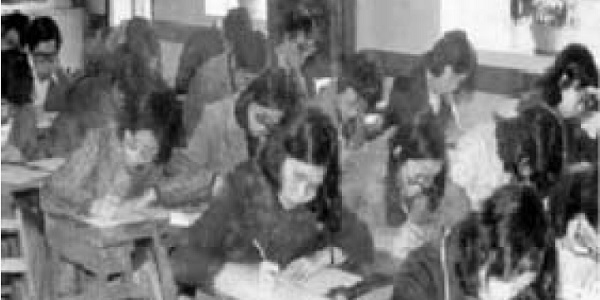
▲A scene between Amy Law and Jiandao Women’s Convent.
Li Yuanru
Born in a non-Christian family, he came into contact with Christianity because he learned English from missionaries. In 1920, she joined Nanjing Jinling Theological Girls' School and was responsible for the teaching and missionary work, as well as the editorial affairs of "Lingguang Newspaper". She was an outstanding revival evangelist and was often invited to preach in various churches. In 1923, he was invited to preach at Xiaoqun Church in Fuzhou. In 1928, he began to work with Watchman Nee and served as editor and publisher of the Shanghai Gospel Book Room. Unfortunately, Watchman Nee later announced his opposition to women preaching in public, so she had to give up her preaching ministry11.
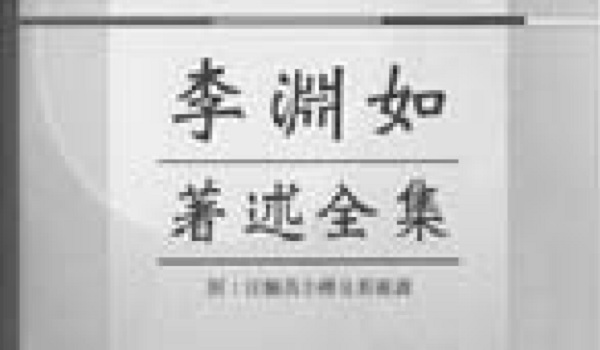
▲The complete works of Li Yuanru.
4. Founder of the organization
Bethel Mission
It was founded by American missionary Hu Zunli and Dr. Shi Meiyu. At first, a church was opened, and later a hospital, a nurse training school, a girls' school and children's work were added. Later, it developed into an evangelistic team, leading evangelistic and revival meetings in various places. Its members included Ji Zhiwen, Song Shangjie, Zhao Shiguang, and many female revivalists. Dr. Liang Jialin believes that Bethel Mission has a very important influence on the Chinese revival evangelistic tradition.
China Domestic Missionary Group
Cai Sujuan and Yu Cidu were both one of the founders. From the investigation, they found that the missionary work in Yunnan, Guangxi, Guizhou, Gansu and other places was very weak, so they joined forces to do missionary work. Chen Yuling was one of the sisters who was sent.
Dr. Liang Jialin believes that many innovative ministries and organizations were originally initiated and established by women. But after the ministry is on track and organized, more and more male co-workers will participate. After the change of one or two generations of leadership, leadership often transfers from women to men, and they begin to teach that sisters are not suitable for leadership. 12.
Looking back on the past? Not what it used to be?
In the early days of the establishment of the Chinese church, especially at the beginning of the 20th century, sisters had a lot of room for service. They could all serve according to their callings and gifts according to the teachings of the Bible, in order to build up the body of Christ and expand the kingdom of God. But today, a century later, the space for sister leadership ministry has generally shrunk, especially in North America. Sisters encounter many obstacles in their participation in preaching, teaching, and leadership. What are the problems? Worth pondering. The author briefly puts forward a few key points13:
1. The current situation creates a hero "female":At the beginning of the 20th century, China experienced great social turmoil, people's mentality changed, and the church experienced a great revival. Sisters usually have a wider space for activity in renewal movements, because these movements have a certain awareness of the end-time crisis and the return of Jesus. The urgency of the situation makes people regardless of role issues, and whoever has the gift will take on the responsibility.
2. Unfair selection of leaders:During the founding of a church or institution, there is a shortage of manpower, and no one in the leadership role of a sister can speak up. Once the work is on track, the church is organized and the power structure is clear. When selecting leaders, power and status begin to be valued more than the needs of life, gifts, and ministry. Sisters are pushed to the margins, and those with leadership responsibilities have to step aside. male.
3. The influence of sects:Many Chinese churches belong to the Southern Baptist Convention and the Missionary Alliance, which adopt a more conservative stance on the service led by sisters. In addition, many independent churches have a gathering place background and are influenced by Watchman Nee's "sisters' view of service." At the beginning of the 20th century, fundamentalism emerged. In order to compete with the social gospel of the new schools, it put aside the social concerns that Christians should have. Unfortunately, women's issues were often involved with the new schools and were excluded. The center of evangelical influence has shifted from the Northeast to the South (Southern Baptist Convention), which emphasizes women's absolute submission. As a result, the freedom of sisters to serve has been restricted.
4. The impact of seminaries:Theological schools with a large number of Chinese theological students, such as Dallas Theological Seminary, Westminster Theological Seminary, Trinity Theological Seminary, and Moody Bible Institute, have many restrictions on the leadership roles of sisters, and ordination will not be considered. Some seminaries did not accept female students in the early days, but later they were willing to accept female students, but they were not allowed to take the elective course of preaching. After graduation, these seminarians entered the Chinese church pastorate, shaping the church's stance on the ministry of sisters.
Summarize
Chinese women have suffered a lot of oppression for thousands of years. Missionaries have brought the light of the gospel to China. Although the church is only two hundred years old, the fate of Chinese women has changed, and they have experienced liberation in body, mind and spirit. We sincerely hope that the Chinese church will no longer “bind” women’s hands and feet so that they can fulfill the gifts and responsibilities entrusted by God to the kingdom of heaven.
Notes
1. Tucker, Ruth A. & Liefeld, Walter. Daughters of the Church (Grand Rapids: Zondervan, 1987), 310-11.
2. Leung Jialin: "Chinese Preaching and Revival Evangelists" (Hong Kong: Kin Tao Theological Seminary, 1999), page 124.
3. Kwok, Pui-lan, Chinese Women and Christianity, 1860-1927 (Atlanta, GA.: Scholars Press, 1992), 81.
4. Liang Jialin, "Chinese Preaching and Revival Evangelists", pp. 153-4.
5. Wu Xiuliang, "Yu Cidu—Pioneer of Chinese Church Revival in the Twentieth Century" (Boston, Ma.: Beeson River Press, 2000), pp. 21-22.
6. Wu Xiuliang, "Yu Cidu - the Pioneer of Chinese Church Revival in the 20th Century", page 6.
7. Liang Jialin, "Chinese Preaching and Revival Evangelists", pp. 135-140.
8. Ibid., p. 153.
9. Ibid., p. 127-8.
10. Ibid., p. 147.
11. Ibid., p. 156-7.
12. Ibid., p. 140-44.13. Qiu Qingping, Liu Xiuxian, and Wu Shuyi: "Give me back the glory of Eden - exploring the identity and role of women from the Bible, history and social issues", (Hong Kong: China Theological Academy, 2004 (reprinted in 2006), pp. 192, 219-220.
Author's Profile Preacher Qiu Qingping has served in the American Chinese Believers Evangelistic Association for more than 30 years. He once served as the deputy director-general, responsible for the propaganda ministry and personnel management. In addition to editing Chinese and English publications, supervising book publishing and study room ministry, he also writes Chinese and English articles and books. The published books include "Walking in Love", "Give Me Back the Glory of Eden", "Heresy and Extremes", "Handling and Reconstruction of Church Conflicts", etc. and some edited and translated books. In addition, he also preaches in various churches and leads retreats and workshops. Sister Qiu currently serves as a ministry specialist at CITIC, specializing in writing and preaching.
